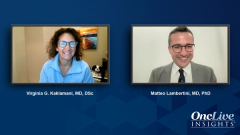
Prevalence of Premenopausal Patients With Breast Cancer
Expert oncologists Matteo Lambertini, MD, PhD, and Virginia Kaklamani, MD, DSc, reflect on the subset of patients with breast cancer who are premenopausal and how that impacts their approach to disease management.
Episodes in this series

Transcript:
Matteo Lambertini, MD, PhD:This is Matteo Lambertini. I’m an associate professor in medical oncology at the University of Genova [in Italy] and consultant in medical oncology at the San Martino Hospital in Genova.
Virginia G. Kaklamani, MD, DSc: My name is Virginia Kaklamani. I’m professor of medicine at UT [University of Texas] Health San Antonio MD Anderson Cancer Center. Today we are going to talk to you about fertility preservation for our premenopausal patients with breast cancer. Matteo, in your practice, what is [the] approximate percentage of premenopausal patients? And give me an idea of what your conversations are typically like with them as far as treatment and family planning.
Matteo Lambertini, MD, PhD:In the Western World, including Italy, which is the country where I work, we can say that the percentage of cases of breast cancer in young women [women younger than 40 years] is [approximately] 5% to 6% [of] the total number of cases. If you go for the premenopausal setting, [it is approximately] 20%. However, there are other parts of the world [where] this percentage is much higher, where we have almost half of patients [with new diagnoses who] are premenopausal at the time of diagnosis and between 20% to 25% under the age of 40 [years]. The topic that we’re going to discuss today is a major burden for many women worldwide. For premenopausal patients, on top of the discussion that we have on treatment decision-making, we have to add some age-related issues and…fertility, which is what we are going to discuss today [and] is one of the most important for them. Virginia, how is your discussion with your premenopausal patients, particularly regarding this topic on oncofertility?
Virginia G. Kaklamani, MD, DSc: In San Antonio…[approximately] 60% of our patients are Hispanic, and many of them have already have children by the time they [receive a] diagnosis [of] breast cancer, even though some of them might be young. Our patients tend to have children at the age of 15, 18, and 20 [years]. But there are several patients who want more children, even though they may have 2 or 3 children by now, and a few who have not had children yet. I think this is what is important to not forget: Once we’re talking about breast cancer and we’re talking about the treatments in chemotherapy and endocrine therapy, we cannot forget fertility and to ask women what their plan is for family. Starting this conversation also frees them to ask questions that maybe they were afraid…to ask themselves.
Transcript edited for clarity.






































